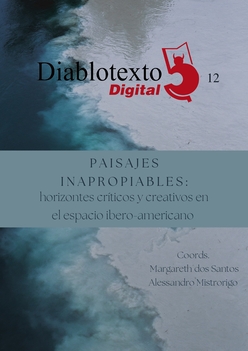Woman in the Brazilian novel of 1930: aporias of public life
DOI:
https://doi.org/10.7203/diablotexto.12.25189Keywords:
Brazilian modern novels, female characters, relations between public and private novel. Abstract
Abstract
The study focuses on six Brazilian novels from the 1930’s – namely: Parque Industrial (1930), by Patrícia Galvão; Os Corumbas (1933) and Rua do siriri (1937), by Amando Fontes; Caminho de pedras (1935), by Rachel de Queiroz; A Estrela sobe (1937), by Marques Rebelo and Lapa (1936), by Luís Martins – based on the presence of women in public life. The path that from the promises of emancipation culminates in prostitution, captures the collective meaning of individual trajectories, a sign of the status’s inoperability of the bourgeois subject woman between the orders of the house and the street.
 Downloads
Downloads
 References
References
BUENO, Luís (2006). Uma história do romance de 30. São Paulo: Edusp, Campinas: Editora da Unicamp.
CANDIDO, Antonio (1951). “The Brazilian family”. En T. Lynn Smith & A. Marchant (eds.), Brazil: Portrait of half a continent. New York: Dryden Press.
DAMATTA, Roberto (1997). A casa & a rua. Espaço, cidadania, mulher e morte no Brasil. Rio de Janeiro: Rocco.
FONTES, Amando (1971). Os Corumbas. Rio de Janeiro, José Olympio/MEC.
FONTES, Amando (s/d). Rua do siriri. Rio de Janeiro, Ediouro.
FREYRE, Gilberto (2004). Sobrados e Mucambos: decadência do patriarcado rural e desenvolvimento do urbano. São Paulo: Global Editora.
GALVÃO, Patrícia (2018). Parque industrial. São Paulo: Editorial Linha a Linha.
MALUF, Mariana; MOTT, Maria (2006). “Recônditos do mundo feminino”. En Fernando Novais y Nicolau Sevcenko (coords.), História da vida privada no Brasil; 3. República: da Belle époque à Era do rádio. São Paulo: Cia das Letras.
MARTINS Martins, Luís (2015). Lapa. Rio de Janeiro: José Olympio.
MARTINS Martins, Luís (2015). Noturno da Lapa. Rio de Janeiro: José Olympio.
QUEIROZ, Rachel de (1990). Caminho de pedras. São Paulo: Aché.
PENA, Maria Valério Junho (1981). Mulheres e trabalhadoras: presença feminina na constituição do sistema fabril. São Paulo: Paz e Terra.
RAGO, Margareth (2018). “Trabalho feminino e sexualidade”. En Mary Del Priori (org.), Carla Bassanezi Pinsky (coord.), História das mulheres no Brasil. São Paulo: Editora Contexto.
REBELO, Marques (1998). A estrela sobe. Rio de Janeiro: Ediouro.
SAFFIOTI, Heleieth (2013). A mulher na sociedade de classes: mito e realidade. São Paulo: Editora Expressão popular.
SCHWARZ, Roberto (1992). Ao vencedor as batatas. Forma literária e processo social nos inícios do romance brasileiro. São Paulo: Livraria Duas Cidades.
Downloads
Published
How to Cite
-
Abstract369
-
PDF (Español)334
Issue
Section
License
Licencia de reconocimiento de Creative Commons “Reconocimiento - No Comercia l- Sin Obra Derivada
Authors who publish with this journal agree to the following items:
The authors will keep their copyright and guarantee the journal the right of first publication of their work, which will be simultaneously subject to the Creative Commons license that allows third parties to share the work indicating its author and its first publication in the journal. The authors may adopt other non-exclusive license agreements to distribute the version of the published work (e.g., depositing it in an institutional telematic file or publishing it in a monographic volume), with an acknowledgment of its initial publication in this journal. The authors are allowed and encouraged to disseminate their work through the Internet (e.g., in institutional telematic archives or on their website) before and during the submission process, which can produce interesting exchanges and increase citations of the published work. (See Effect of Open Access)




